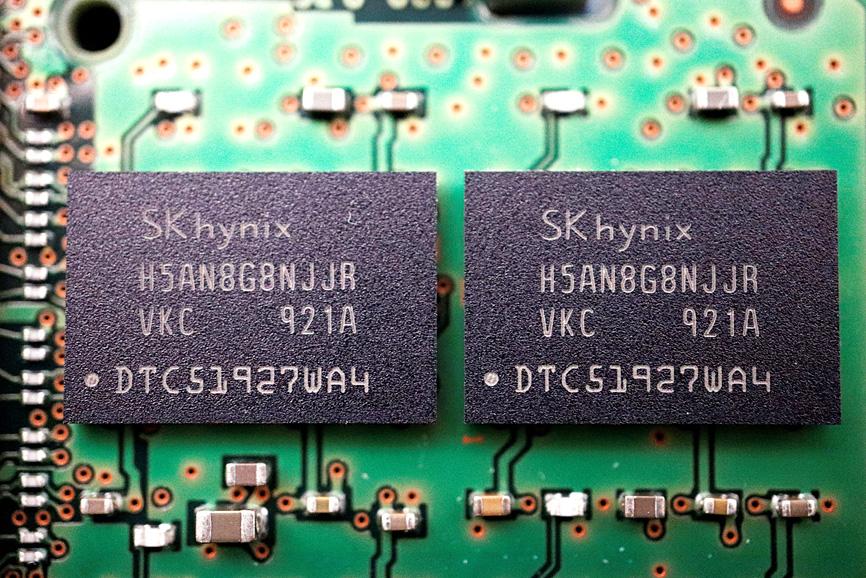World chip sales growth has decelerated for six straight months in another sign that the global economy is straining under the weight of rising interest rates and mounting geopolitical risks.
Semiconductor sales rose 13.3 percent in June from a year earlier, down from 18 percent in May, data from the global peak industry body showed. The slowdown is the longest since the US-China trade dispute in 2018.
The three-month moving average in chip sales has correlated with the global economy’s performance in the past few decades. The latest weakness comes as concern about a worldwide recession has prompted chipmakers such as Samsung Electronics Co to consider winding back investment plans.

Photo: Reuters
Semiconductors are key components in a world that is increasingly reliant on digital products and services, particularly during the COVID-19 pandemic, when a lot of work and schooling was conducted remotely.
Chip sales started to cool as central banks began scrambling to raise interest rates to combat spiraling inflation, and Russia’s war in Ukraine and prolonged COVID-19 lockdowns in China prompted a rapid reversal in the international outlook.
A Bloomberg Economics global tracker showed the prospects for the world economy have deteriorated rapidly this year, coinciding with chip sales beginning to slow.
Signs of an international downturn are also observed in trade data from South Korea, the world’s biggest producer of memory chips. Growth in chip exports last month eased to 2.1 percent from 10.7 percent in June, the fourth straight monthly decline.
In June, semiconductor stockpiles rose by the most in more than six years.
It is a similar story in Taiwan, which is another key player in electronics supply chains. The latest data indicated that manufacturing in the nation contracted in June and last month, while production and demand slumped, with new export orders registering the biggest fall.
The weakening momentum in these two canaries in the global coal mine is partly due to a slowing economy in China, which continues to impose lockdowns under its “zero COVID-19” policy. China’s factory activity unexpectedly contracted last month and property sales continue to shrink.
In the US, GDP has fallen for two straight quarters, although Cambridge, Massachusetts-based think tank the National Bureau of Economic Research refuses to call it a recession.
In Europe, factory activity plunged in June, further darkening the outlook for the continent and the wider world.
Nonetheless, the IMF still sees a global expansion this year, and slowing chip sales do not automatically indicate a recession is imminent.
However, they offer a glimpse into the health of an international economy that relies heavily on the tiny components to manufacture everything from vehicles to smartphones to computers.
The peak world body — the Washington-based Semiconductor Industry Association — says it represents 99 percent of the US chip industry by revenue and almost two-thirds of non-US chip firms.
The sales it releases are compiled by World Semiconductor Trade Statistics.

Taiwan Semiconductor Manufacturing Co (TSMC, 台積電) yesterday said that its investment plan in Arizona is going according to schedule, following a local media report claiming that the company is planning to break ground on its third wafer fab in the US in June. In a statement, TSMC said it does not comment on market speculation, but that its investments in Arizona are proceeding well. TSMC is investing more than US$65 billion in Arizona to build three advanced wafer fabs. The first one has started production using the 4-nanometer (nm) process, while the second one would start mass production using the

A TAIWAN DEAL: TSMC is in early talks to fully operate Intel’s US semiconductor factories in a deal first raised by Trump officials, but Intel’s interest is uncertain Broadcom Inc has had informal talks with its advisers about making a bid for Intel Corp’s chip-design and marketing business, the Wall Street Journal reported, citing people familiar with the matter. Nothing has been submitted to Intel and Broadcom could decide not to pursue a deal, according to the Journal. Bloomberg News earlier reported that Taiwan Semiconductor Manufacturing Co (TSMC, 台積電) is in early talks for a controlling stake in Intel’s factories at the request of officials at US President Donald Trump’s administration, as the president looks to boost US manufacturing and maintain the country’s leadership in critical technologies. Trump officials raised the

‘SILVER LINING’: Although the news caused TSMC to fall on the local market, an analyst said that as tariffs are not set to go into effect until April, there is still time for negotiations US President Donald Trump on Tuesday said that he would likely impose tariffs on semiconductor, automobile and pharmaceutical imports of about 25 percent, with an announcement coming as soon as April 2 in a move that would represent a dramatic widening of the US leader’s trade war. “I probably will tell you that on April 2, but it’ll be in the neighborhood of 25 percent,” Trump told reporters at his Mar-a-Lago club when asked about his plan for auto tariffs. Asked about similar levies on pharmaceutical drugs and semiconductors, the president said that “it’ll be 25 percent and higher, and it’ll

CHIP BOOM: Revenue for the semiconductor industry is set to reach US$1 trillion by 2032, opening up opportunities for the chip pacakging and testing company, it said ASE Technology Holding Co (日月光投控), the world’s largest provider of outsourced semiconductor assembly and test (OSAT) services, yesterday launched a new advanced manufacturing facility in Penang, Malaysia, aiming to meet growing demand for emerging technologies such as generative artificial intelligence (AI) applications. The US$300 million facility is a critical step in expanding ASE’s global footprint, offering an alternative for customers from the US, Europe, Japan, South Korea and China to assemble and test chips outside of Taiwan amid efforts to diversify supply chains. The plant, the company’s fifth in Malaysia, is part of a strategic expansion plan that would more than triple